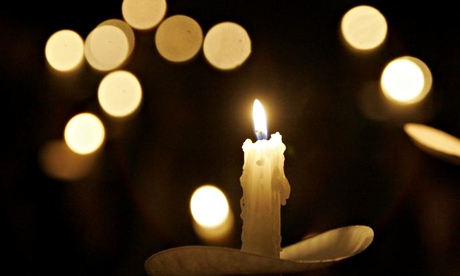
This week, the first of George Herbert’s pair of Christmas poems, published in his posthumous collection, The Temple, provides a pause for reflection in the season of frantic shopping and “frost-nipt sunnes”. Christmas (I) tells the Nativity story from an innovative angle, and realigns one of Herbert’s favourite tropes for denoting the relationship of God and the soul, that of kindly host and needy guest.
In their physicality of design, reference and voice, Herbert’s poems have a mysterious power of yielding themselves to contemporary experience and interpretation. Shoppers and partygoers alike might sympathise with the exhausted rider (“quite astray”) evoked at the beginning of Christmas (I). The unexpected opening modifier, “After all pleasures,” contains an important ambiguity. The preposition “after” suggests both a following in time, and an actual pursuit. Herbert’s speaker, seemingly, is exhausted both by the pleasures experienced and by the process of chasing them, as if unsatisfied pursuit and unsatisfied consumption were as crazily embroiled in the 17th century as the 21st.
The older meaning of “affection” is “disposition”, and the plural, “affections”, in line three, suggests a throng of bodily and emotional needs, rushing about like hunting dogs that are “in full crie” and yet have lost the scent of their prey. There’s no lecture on the emptiness of pleasure-seeking – simply a vividly realised picture of heated chase and confused disappointment – “the grief/ Of pleasures …” That the inn where the rider pauses is partly an ordinary country inn, a natural place of recovery for huntsman and horse, is suggested by the wonderfully casual demotic of “I took up in the next inne I could finde”. But this inn is also the one in Bethlehem, whose stables are Christ’s birthplace. Touching on his favourite, lovely “hospitality” metaphor, Herbert reveals that Christ is already there, awaiting the traveller “and all passengers” like the kindliest of welcoming hosts.
A little metaphysical punning follows. God has “contracted” his light to be born in human time; he has made his light very much smaller to suit his incarnation, and he has made mankind a binding promise. There’s an almost maternal tenderness in this image of God “wrapt in night’s mantle”, and a beautiful hush on the word “stole” that seems to recall the mediaeval carol: “He cam also stille/ To his modres bowr.”
The mood is picked up in the emotional repetition of the epithet, “My dear,/ My dearest Lord …” From then on, the sonnet turns from first-person narrative to direct apostrophe, from anecdote to prayer.
The symbolism of Christ’s rebirth in the human soul is hardly original. But Herbert’s metaphysics are always strongly rooted in the actual, and his speaker’s prayer is sharp and fresh when he pleads, “To Man of all beasts be not thou a stranger …” The supposed overlord of the animal kingdom, Man, is singled out but also “contracted” at a stroke, to become just another beast in the stable. An almost timid recognition of how distant such a being is from God underlines the plea, “Be not thou a stranger”. And then Herbert lightens the mood with a new metaphor, one of immediate interest to any of his parishioners planning to “deck the hall” – or the hovel. But the reference is only briefly playful, and Herbert’s speaker is looking ahead to the crucifixion when he asks that his “dark soul and brutish” be furnished and decked so as to be a fit lodging for Christ, “better … than a rack or grave”. God alone can effect such a superhuman transformation, of course.
Nonetheless, in this Christmas sonnet, the host is human, and the guest appropriately divine. So a familiar concept rings out newly, renovated like the soul to become a place of refuge for the divinity. However alien these theological concepts and the dualism underlining them may be to modern thought, Herbert seems able to open windows onto the secular without the reader’s having to force language and theology against the grain. His orator’s rhetoric is gentled into story and internal conversation. He is the preacher who never sermonises, the worshipper who constructs his God’s luminous humanity out of his own. He meets the 21st-century reader much closer than halfway.
Christmas (I)
After all pleasures as I rid one day,
My horse and I, both tir’d, bodie and minde,
With full crie of affections, quite astray,
I took up in the next inne I could finde,
There when I came, whom found I but my deare,
My dearest Lord, expecting till the grief
Of pleasures brought me to him, readie there
To be all passengers most sweet relief?
O Thou, whose glorious, yet contracted light,
Wrapt in night’s mantle, stole into a manger;
Since my dark soul and brutish is thy right,
To Man of all beasts be not thou a stranger:
Furnish & deck my soul, that thou mayst have
A better lodging than a rack or grave.

